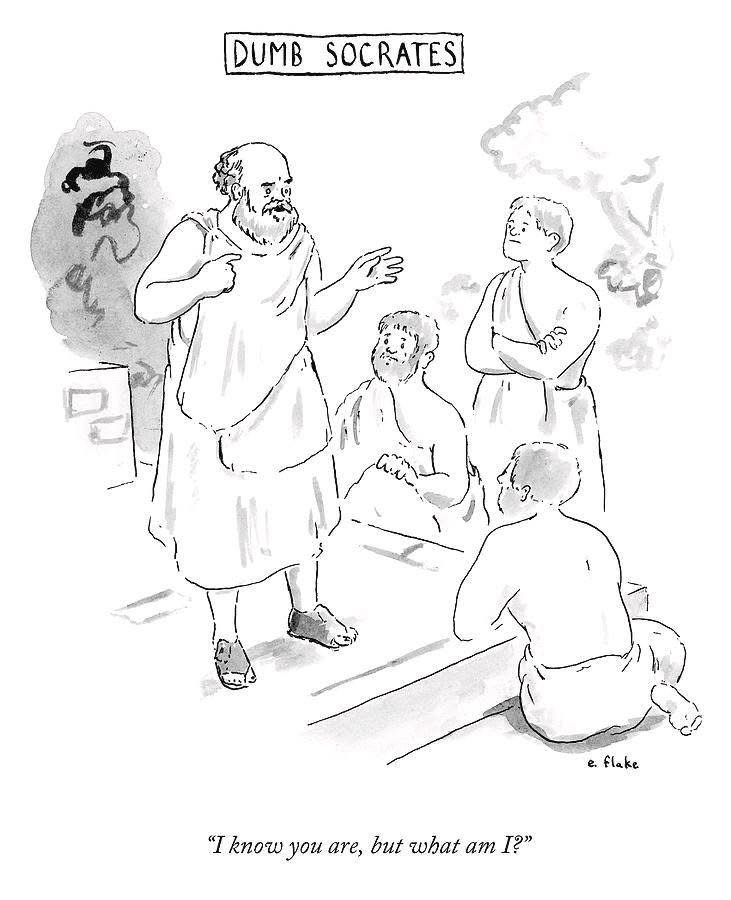Posted: 2025-10-05
 Emily Flake - Dumb Socrates (reproduced with permission)
Emily Flake - Dumb Socrates (reproduced with permission)
Table-Turning 101
🔗 Introduction
Table-turning is a very common toxic communication style that many people use as a way of handling perceived criticisms or attacks. The central idea is to respond by redirecting the topic of conversation back towards the other person.
It exists on a wide continuum: sometimes it's very clear cut and simple, and other times it's difficult to clearly identify.
🔗 What It Looks Like
Person A raises a legitimate concern or problem. Person B replies with:
"You're one to talk."
"Same goes for you."
"That's a bit rich coming from you."
"You should take your own advice."
"What about your XYZ?"
A somewhat subtler version: "Hmm yes, XYZ, that sure is a problem isn't it."
And my favourite real-world example: "Sure, I'll stop table-turning, but you have to stop as well!"
It can consist of bringing up an unrelated past incident too.
It also often involves echoing words or phrases used in the initial concern.
🔗 Independent of Topic
A large part of what makes this a toxic communication style is that it is completely independent of the actual topic — you can make these replies to basically any concern and the structure of the interaction doesn't change at all. The response is completely disconnected from actually addressing what is being raised.
🔗 Never Defend, Only Attack
This strategy naturally evolves out of feeling like there is nothing to gain and everything to lose by defending a criticism. It therefore seeks to respond to any attack with a counterattack — placing the other person in a defensive position.
The counterattack doesn't have to make sense. It doesn't have to be based in anything and doesn't have to make any actual claims — even just a vague insinuation is fine. All it has to do is shift the focus so the other person is the one defending.
🔗 Projecting Hypocrisy
The counterattack nearly universally takes the form of stating, implying or insinuating that the person is being hypocritical. This is likely because it takes nearly no effort — the argument has already been made — but has a high emotional return.
🔗 It Is Often A Fallback
Defense mechanisms to perceived attacks exist in layers like an onion. Some people lead with table-turning, but some people keep it deep in their stack as a late- or last-resort option.
This makes it more effective, because if they only pull out the trump card when nothing else is left, it preserves more of its power and feels more like they were trying to politely avoid pointing out the hypocrisy.
It is still equally toxic wherever it sits in the defense stack.
🔗 It's Kind Of Addictive
What's particularly problematic about this style is that it feels like you're making a good point. It feels like you undermined the person's argument, and your brain gets the reward feeling that it would have from actually picking it apart.
When they have a satisfying answer to every possible argument, and it always works, many people naturally tend towards using it more and more. It often becomes a default.
🔗 Cognitive Consequences
The upshot of regularly using table-turning is that your ability to hold yourself and others to account atrophies: if the outcome of conflict is the same regardless of what the person has actually said or done, the person's choices no longer matter. They cannot get anything right or wrong — the outcome is the same regardless.
This is absolutely devastating to a person's integrity, and their internal ethical framework can fall apart alarmingly quickly.
🔗 It Makes You A Worse Person
You owe it to yourself to catch this behaviour and to point it out in people you care about. There is no upside to doing it other than feeling gratified during conflict. The long-term consequences of engaging in it are deeper and more serious than may be obvious: it structurally compromises your values and moral foundations.
Let's all do better.
🔗 Non-Pathological Table-Turning
When someone in a position of power over you makes an unreasonable demand, an ethical version of the same concept can be useful and effective way to highlight the actual hypocrisy.
Carefully used, this can be a powerful tool. But this is not to deflect a concern, but rather underscore it. The usage is inverted.
Checkin
Version: 2
Written: 2025-09-20
Written on: 10mg olanzapine since 2025-07-20, 7.5mg before that - likely causing severe cognitive impairment
Mental health was: very poor - estimate 10% brain